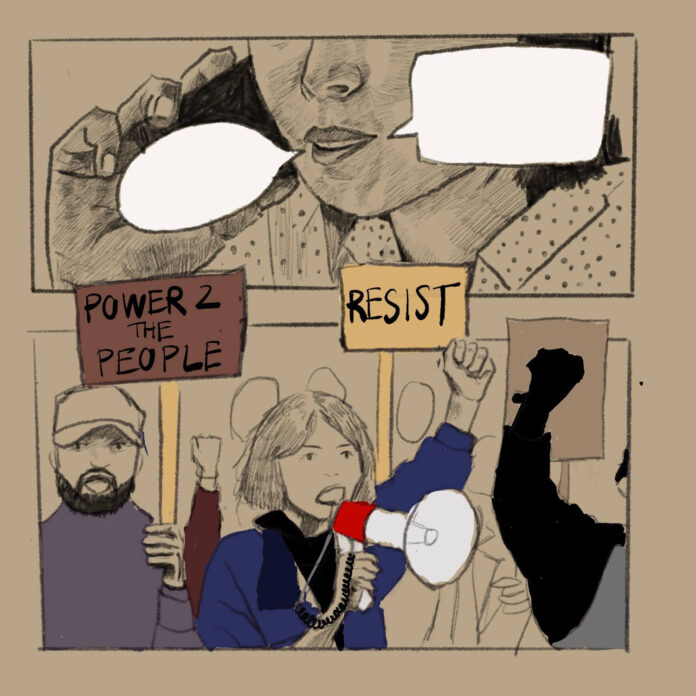You must have heard the news by now: three LA city council members spewed racist remarks against various groups of people with many of their conversations caught on tape. Former city council president Nury Martinez called fellow council member Mike Bonin’s Black adopted son “a little monkey,” and exhibited her distaste for George Gascon, the reformist head prosecutor in LA county, by saying he was “with the Blacks.” Additionally, she stated that council member Mitch O’Farrell, a gay man, was a “diva.”
Many intelligent people have dedicated column after column to argue that the racist and homophobic statements from city hall should be denounced and how the council members involved — Nury Martinez, Gil Cedillo, and Kevin de León — deserve to leave politics with disgrace. We can talk day after day about how this leaked recording represents the need for more racial reconciliation in the city, how we need to demand a higher standard from our leaders, and so on. However, the origins of these conversations display something deeper: we as citizens should care more about what powers the government has.
The council members were not merely racist for the sake of being racist — they were discussing how to redistrict the city in order to maximize the power of voting blocs they felt loyal to. For example, de León said that council member Nithya Raman’s renter-heavy district is “the one to put in a blender and chop up” in order to ensure her loss in 2024 and that they wanted Heather Hutt to succeed Mark-Ridley Thomas because they felt she would be one of their allies. We might be surprised at the casual nature of their conversations — considering how these council members were so open about discriminating against renters and African Americans — but we shouldn’t be.
Politicians are people too — not in a positive sense. Politicians shouldn’t be revered as benevolent as they have similar biases and errors of reasoning as the rest of us. If we wouldn’t trust racist, classist politicians such as Nury Martinez to wield a specific power of the government in a way that promotes the common good, we should be warier about enabling the government to have that power in the first place. Of course, this is obvious in the case of redistricting — and Raman recently introduced a motion to create an independent redistricting commission that would not have nakedly political motivations behind drawing the lines — but we should apply this kind of analysis to all kinds of powers the government has.
We cannot always assume that electing better politicians will solve our problems because we cannot always expect good rulers — after a certain point we need good rules. Of course, going directly to citizens will run into a similar problem as going to politicians (those of us in California who experience the deluge of ballot proposition ads can attest). However, if we want large structural changes we need to consider more deeply what incentives ordinary people would have with the government’s powers.
For example, one of the most significant powers that council members have is control over land use and development. Some might argue that we need to preserve this power because they can “negotiate with developers.” In New York City, which has a powerful role for council members in land use regulation, politicians often withhold support for developments unless the developer provides certain concessions — even if the concessions demanded are arbitrary and change constantly. Although this power occasionally yields good concessions, it easily works against the public’s interest; in LA, which has a similar tradition of member prerogative, former council members Mitchell Englander and Jose Huizar used their land use power to extract bribes in exchange for allowing developments to proceed. If this power over land use actually helps create greater affordability, as some advocates for keeping this power insinuate, why are LA and New York City some of the most expensive rental markets in the country?
So, if a council member attempts to exercise a certain power — be it discretion over land use “for affordability” or clearing encampments “for public health” — we cannot assume their motives are always just. The powers that the government has can be used for ill just as much as for good, and we who take it upon ourselves to care about those less well off — the poor, sick, elderly, children, those in jail or prison, etc. — should take extra care not to let any politicians capture our imagination and exercise their powers without scrutiny.
One doesn’t have to be vehemently anti-government, libertarian, or anarchist to understand that any power given to our government could easily be used by the next Jose Huizar, Nury Martinez, or any other politician who primarily cares about their power. Importantly, as the powers of government increase, it’s more likely that someone will try to use them for personal gain. We need to be conscious about what solutions our leaders are hawking; do they want to change the rules to restrain their ability to do harm, or do they want to just use the current system “for good?”
![]()































